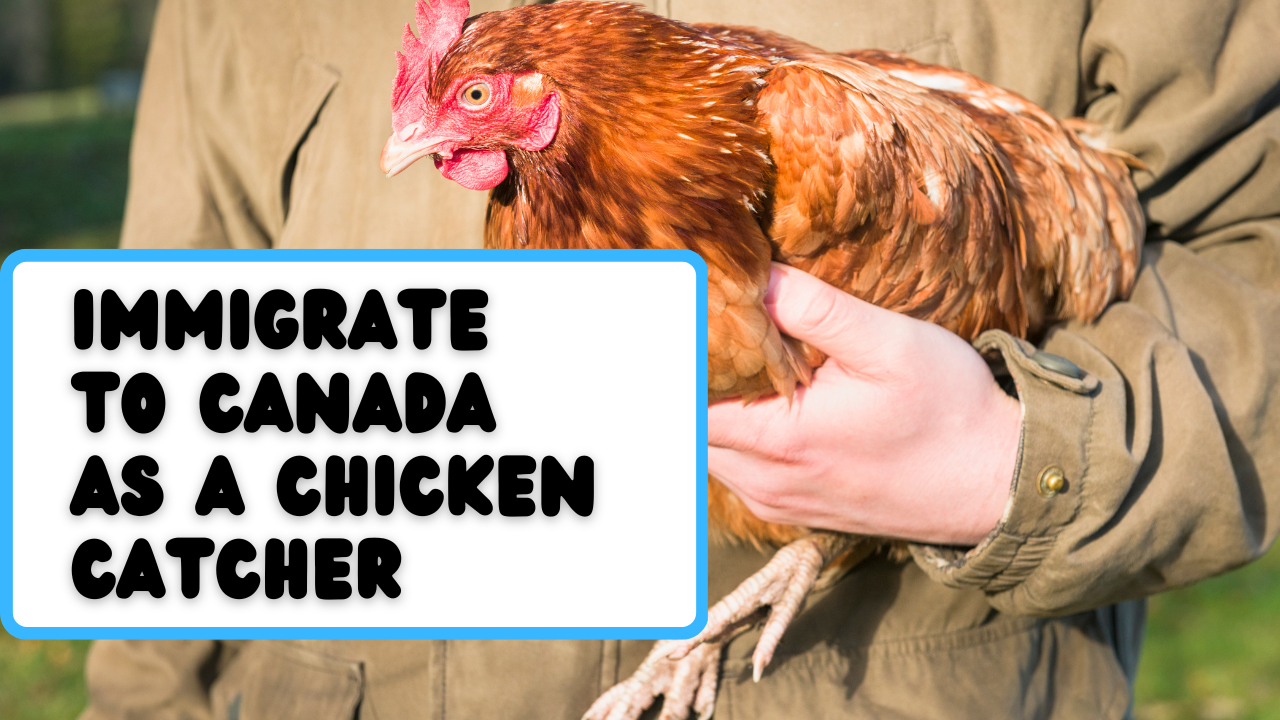In this article we cover the main immigration programs for general farm workers – chicken catchers (NOC 8431, C-skill level) and how to apply for Canada PR as a chicken catcher.
What's Covered in This Article
Chicken Catcher Canada Job Description Duties/Responsibilities:
- Manually and/or mechanically catching and loading birds into crates for transport to the plant
- Catch and load chickens in a timely, efficient and safely manner using proper lifting and loading techniques
- Operate catching and loading equipment using proper techniques and procedures to ensure safe handling of birds.
- Detect disease and health problems in poultry
- Write daily basic progress reports
Qualifications for Chicken Catcher Canada Job:
- Strong work ethic and attention to Animal Welfare practices.
- Must be capable of physical work in varying farm environments.
- Must have no difficulty handling poultry
- Ready to work in a dark and smelly environment.
- Prepared and able to undertake physical work.
- Has a keen sense of how to work safely and hygienically so previous experience is favourable
- Have a good level of manual dexterity in order to catch and hold the birds humanely
- Have a very positive attitude to your work and be able to complete tasks quickly and efficiently.
How to find a job in Canada as a chicken catcher
When it comes to finding a chicken catcher job in Canada, try the Canadian job bank website first, so you get an understanding of what kinds of jobs are in demand in Canada today in the Farm and Agricultural sector.
Canadian job search websites such as Indeed, Monster, Craiglist etc are also excellent ways for immigrants to find jobs in Canada.
You can also look for chicken catcher jobs in Canada via reliable employment agencies in Canada. Please do your own business before you engage anyone.
Main Canada immigration pathways for you as a chicken catcher
-
Temporary Foreign Worker Program
You can be hired as a chicken catcher under the temporary foreign agricultural worker under one of the following streams:
Seasonal Agricultural Worker Program
- temporary foreign worker must be from Mexico or the participating Caribbean countries
- production must be included on the National Commodities List
Agricultural stream
- temporary foreign worker can be from any country
- production must be included on the National Commodities List
Stream for high-wage positions
- production is not included on the National Commodities List
- temporary foreign worker can be hired for any high-wage agricultural position
Stream for low-wage positions
- production is not included on the National Commodities List
- temporary foreign worker can be hired for a low-wage agricultural position
2. Agri-Food Pilot program
The pilot provides a pathway to permanent residence for experienced, non-seasonal workers in specific industries and occupations.
IRCC extended this pilot and will be accepting applications until May 14, 2025.
Eligible industries
Industries are classified by the North American Industry Classification System (NAICS). You can see specific industry definitions by searching the industry codes below on the NAICS website.
Your employer needs to include the industry code in your job offer.
Eligible industries under the pilot are:
- meat product manufacturing (NAICS 3116)
- greenhouse, nursery and floriculture production, including mushroom production (NAICS 1114)
- animal production, excluding aquaculture
- cattle ranching and farming (NAICS 1121)
- hog and pig farming (NAICS 1122)
- poultry and egg production (NAICS 1123)
- sheep and goat farming (NAICS 1124)
- other animal production (NAICS 1129)
Eligible occupations
Occupations are classified by the National Occupational Classification (NOC) code. You can check the duties for each occupation by searching the NOC website.
Eligible occupations for each eligible industry are listed below.
For meat product manufacturing (NAICS 3116), eligible occupations are
- NOC 63201 – Butchers – retail and wholesale
- NOC 65202 – Meat cutters and fishmongers – retail and wholesale
- NOC 94141 – Industrial butchers and meat cutters, poultry preparers and related workers
- NOC 82030 – Agricultural service contractors and farm supervisors
- NOC 84120 – Specialized livestock workers and farm machinery operators
- NOC 85100 – Livestock labourers – chicken catchers fall here.
- NOC 95106 – Labourers in food and beverage processing
For greenhouse, nursery and floriculture production, including mushroom production (NAICS 1114), eligible occupations are
- NOC 82030 – Agricultural service contractors and farm supervisors
- NOC 84120 – Specialized livestock workers and farm machinery operators
- NOC 85100 – Livestock labourers
- NOC 85101 – Harvesting labourers
For animal production, excluding aquaculture (NAICS 1121, 1122, 1123, 1124 and 1129), eligible occupations are
- NOC 82030 – Agricultural service contractors and farm supervisors
- NOC 84120 – Specialized livestock workers and farm machinery operators
- NOC 85100 – Livestock labourers
- NOC 85101 – Harvesting labourers
Annual application limits
IRCC will process a maximum limit of 2,750 applications each year. They no longer use annual limits for individual occupations.
Starting on January 1 of each year, IRCC will process applications on a first-come, first-served basis.
If they reject your application because the annual limit has been reached, they’ll refund your application fees.
To apply for permanent residence under the Agri-Food Pilot, you need
- eligible Canadian work experience in one or more of the eligible industries and occupations
- a minimum of 1 year of non-seasonal, full-time work in the past 3 years (at least 1,560 hours)
- as a chicken catcher
- through the Temporary Foreign Worker Program
- A Labour Market Impact Assessment (LMIA) with a minimum 12-month duration must have been submitted by your employer when hiring you. If you’re not sure, you can ask your former or current employer about the duration.
- a full-time, non-seasonal job offer from a Canadian employer in one of the eligible industries and occupations in this case chicken catcher, (outside of Quebec)
- job must be as a chicken catcher
- The job must be full time.
- This means you work at least 30 paid hours per week.
- The job must be non-seasonal.
- In general, this means you have consistent and regularly scheduled paid employment throughout the year.
- Your employment is permanent.
- This means that there is no set end date.
- For unionized positions, the wage must be determined by the applicable collective agreement.
- For non-unionized positions, the wage must meet or exceed the Job Bank’s prevailing (median) wage for the occupation listed on your job offer in the province of employment (or at the national level if no provincial rate is available).
- to meet or exceed the language requirements
- CLB 4
- to meet or exceed the educational requirements
- You must have at least
- a Canadian high school diploma, or
- an educational credential assessment (ECA) report from a designated organization or professional body showing that you completed a foreign credential at the secondary school level or above
- The ECA report must be less than 5 years old on the date of your application.
- The original ECA report must have been issued on or after the date the organization was designated.
- You must have at least
- to have settlement funds (if applicable)
- You must prove that you have enough money to settle in Canada. You’ll need to prove that you have enough funds to support yourself and any family members you may have, even if they’re not coming to Canada with you.
- If you’re already working in Canada with a valid work permit when you apply, you don’t need to provide proof of settlement funds. Find out more about settlement funds
- to maintain temporary resident status (if already in Canada)
3. Quebec permanent immigration pilot program stream
Quebec offers a pathway to permanent immigration for French-speaking workers who have jobs in NOC 8431 – General farm worker, but only in the position of chicken catcher.
Qualified temporary foreign workers in Quebec can apply for Canada PR under the Quebec permanent immigration pilot program stream.
This pilot program allows temporary foreign worker in Québec’s food processing sector to settle in Québec permanently.
Among other factors, to be selected under the Quebec permanent immigration pilot program for workers in food processing stream, foreign workers must:
- be 18 years of age or over;
- intend to settle in Québec to hold a job;
- have respected the conditions of your stay in Québec;
- have obtained a diploma minimally corresponding to a high school diploma or a Québec diploma of vocational studies, obtained in a study program of at least one year, full time;
- hold an eligible job (NOC 8431) in Québec at the time of submission of your application;
- have held an eligible chicken catcher job for a period of at least 24 months:
- on a full-time basis;
- in Québec;
- in an eligible sector;
- during the 36 months preceding the date of submission of your application.
- have knowledge of oral French that corresponds to Level 7 on the Échelle québécoise des niveaux de compétence en français des personnes immigrantes adultes (PDF 1.88 Mb) (in French only) or its equivalent;
- Donc, si vous avez des compétences en français qui correspondent à un niveau 7, vous devriez envisager cette voie d’immigration
- demonstrate financial self-sufficiency.
Essential needs for a family unit
for the three-month period indicated in the contract
(Effective January 1 to December 31, 2022)Number of children under 18
who are accompanying youOne adult Two adults 0 $3,371 $4,943 1 $4,530 $5,537 2 $5,112 $5,976 3 $5,695 $6,416
The Quebec permanent immigration pilot program allows for the selection of 550 workers in the food processing sector per year and their family members.
How to apply to the permanent immigration pilot program for food processing workers as a chicken catcher:
This pilot program opened on March 24, 2021 and is planned to close on January 1, 2026.
During this time, the MIFI plans to select 550 workers and their families every year.
To apply under this stream, foreign workers must submit their application for permanent selection through the ARRIMA portal in order to obtain a Certificat de selection du Québec (CSQ).
For more detailed information on a specific rule, refer to the Québec Immigration Act , the Québec Immigration Regulation , or the Regulation to make three permanent immigration pilot programs



